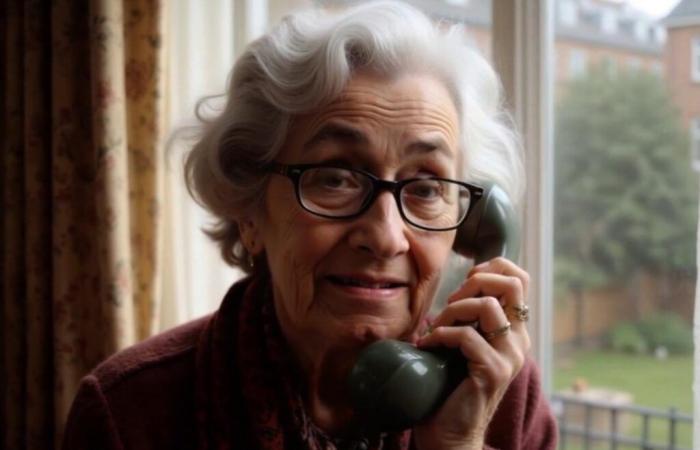British telecoms company Virgin Media O2 has found a hilarious and very effective solution to make life difficult for scammers: say hello to dAIsy, an adorable grandmother created using artificial intelligence specifically to serve as a shield against these unscrupulous individuals.
Telephone scams are a real scourge. But not all potential victims are in the same boat. Some people are more exposed to the schemes of these thugs, and this is particularly true for certain older and/or isolated people.
If these are preferred targets, it is because they generally have a more limited digital culture than the rest of the population. They are therefore less well equipped to recognize certain social engineering tactics potentially serious consequences. A breach into which scammers are eager to rush to extort their personal information, or worse yet, the savings accumulated throughout their professional life.
To block the way for these malicious actors, Virgin Media O2 has come up with a fairly original strategy: imitate their favorite target in order to make them go crazy.
To lay the foundations for this project, the company called on Jim Browning, a videographer famous for his mastery of scambaiting. For those who are not familiar with this term, it refers to a form of computer vigilantism which consists of trapping scammers. Sometimes, it is simply a matter of wasting valuable time for the profitability of their business; in other cases, the most diligent scambaiters can even build a solid case that can then be forwarded to the relevant authorities in order to put the scammer out of harm’s way.
Subscribe to Journal du Geek
A merciless virtual granny
His expertise helped Virgin teams develop a speech synthesis model specifically designed for conversing with scammers on the phone. The result, called dAIsy, presents itself as an adorable, very vulnerable grandmother; but it is in fact a virtual entity programmed to playing with scammers’ expectations in real time without ever responding to them.
Daisy begins by spreading some particularly tempting bait, such as sentences that reveal her benevolence or her gullibility. Obviously, these thugs see a real potential gold mine, and therefore launch into a well-oiled seduction campaign to steal his credit card number or bank details. But what they don’t know is that they are actually venturing into a labyrinth of worldliness that will put their patience to the test.
Every time she seems about to give in, Daisy turns the conversation to an entirely different topic, for example by telling an extended story about her grandchildren, her passion for knitting or the antics of her beloved cat. She then repeats the process indefinitely, until the scammer loses patience. And when they seem on the verge of giving up, she adopts a different strategy: giving false banking information that the scammer will inevitably have all the trouble in the world to validate. By feigning some confusion and innocent mistakes, she can therefore make your interlocutor go around in circles for a considerable timewhen he thinks he’s finally reaching the end.
“It’s been almost an hour, damn it!“, exclaims, for example, an exasperated scammer in the presentation video. “Well, how time flies!“, Daisy responds innocently.
A solution against illegal canvassing?
Apparently, the result is so convincing that some of these scam specialists are stayed online for more than 40 minutes without any resultsand often without even realizing that they themselves had been victims of a scam! In addition to putting the scammer through real mental torture, Daisy makes him wasting valuable time that could otherwise be used to approach real users. It therefore indirectly protects dozens of potentially vulnerable people – but not only that. Through her ramblings, she also helps highlight recurring patterns in the strategies used by scammers. This information can then be used to raise awareness, or to give ammunition to organizations fighting against these fraudulent calls.
Of course, it’s probably only a matter of time before scammers find a way to put Daisy on some kind of blacklist (irony, when you’ve got us!). But this strategy could easily be adapted to create a real army of virtual seniors of this type. From a certain scale, this could have a more than significant impact on the profitability of these scams, thus forcing the usurpers to move towards another potentially less harmful activity.
All that remains is to hope that a French operator will decide to replicate this experience in France. The timing seems ideal, since the Senate recently voted unanimously a bill aimed at prohibiting non-consented telephone canvassing ; if the text is also validated in the Assembly, a made-in-France Daisy could also help deter offenders!
???? To not miss any news on the Journal du Geek, subscribe on Google News. And if you love us, we have a newsletter every morning.






